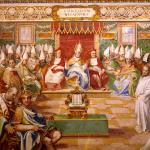The Lutheran Church of Australia (LCA) is debating the ordination of women to the pastoral office. Three times the proposal has been voted down, but it’s up again at the upcoming convention in October.
I have here links to two documents that set forth the case for each side. Which one do you think makes the best case?
The pro-women’s ordination position is given here: The Draft Doctrinal Statement (DDS) on A Theological Basis for the Ordination of Women and Men.
An opposing argument is made in an open letter from four seminary professors (including my son-in-law): A Letter of Appeal and Encouragement to the LCA.
Here is an excerpt from that document that engages some of the points raised by the DDS:
It is not our intention to call into question anybody’s commitment to the authority of scripture in the LCA. However, we are concerned that the DDS threatens to undermine the church’s confidence in the clarity, authority, and sufficiency of scripture to guide its doctrine and practice. The following three examples illustrate this point:
(1) In relation to Paul’s instructions about worship in 1 Corinthians 14, the structure and flow of the passage from v. 26 onwards suggests that in vv. 34–35 Paul prohibits female prophets (wives though they may also be) from publicly scrutinizing other male prophets. In other words, they are not to take the lead in what might be called doctrinal oversight. However, since the DDS begins its discussion at v. 33, this key point is obscured. For example, the DDS claims that the wives whom Paul commanded to keep silent in vv. 34–35 must be distinguished from the women who prophesied in Corinth. This claim is unproven. Verse 32 shows plainly that Paul is talking about the proper subordination of prophets to prophets. Whatever exegetical questions might remain concerning 1 Corinthians 14, the same kind of prohibition is also clearly set forth in 1 Tim 2:12.
(2) This leads to a second danger in the way the DDS addresses this theological issue. When it comes to assessing scripture’s authoritative claims, we must allow scripture to be its own interpreter, otherwise it becomes subject to arbitrary human judgments. The DDS ignores Paul’s own reasons for his prohibitions based on the word of God (1 Cor 14:34; 1 Tim 2:13–14) and, as noted above, substitutes for them speculation.2 Such an approach casts doubt on the sufficiency of the word of God to speak from out of its own patterns and order, and indeed its authority to do so. What is more, while many biblical texts speak of women serving in various ways, as the DDS points out, the church listens first and foremost to those texts that speak most directly to the question at hand. Against the two texts cited in TA 6.11, we find no biblical text that clearly endorses an independent, public, authoritative teaching role for women in the worshipping assembly.
(3) For the same reasons, we do not believe that Gal 3:26–28 has the probative weight that the DDS assigns it. This part of Paul’s letter deals with our baptismal standing before God, not with the pastoral office. The DDS suggests that prohibitions against ordaining women are a human construct. But Paul, with the rest of scripture, teaches that the distinction between man and woman is grounded in the creative work of God (1 Tim 2:13). In that way, the distinction differs fundamentally from the distinction between slave and free, which is of human origin, or that between Jew and Gentile, which is not grounded in creation but in God’s redemptive purposes (Genesis 12). Since the distinction between man and woman is grounded in creation, to maintain the distinction within the worshipping community is not against the gospel but congruent with it (1 Cor 11:2–16). One of the ways that scripture maintains that distinction is by assigning the pastoral office to rightly called and ordained men rather than to women. The DDS claims that the public ministry is apostolic in that “it exists to proclaim and enact the teaching of the apostles.” That is correct. But when the DDS goes on to claim that the precedent of male apostles does not require that pastors be male today, it must set aside Paul’s own teaching that God has entrusted the pastoral ministry to rightly called and ordained men. We do not deny that the New Testament contains time-bound practices or customs. But apostolic commands that are grounded in the created order or in the word of God cannot be so lightly dismissed.
Implications of a change in doctrine and practice
Given these concerns for the clarity, sufficiency, and authority of scripture, the question arises as to whether the DDS sets a dangerous precedent for how we handle scripture in other matters. We all have experience of overseas Lutheran churches, and have observed what has happened in Lutheran churches, at least in the West, that have decided to set aside biblical texts in order to ordain women. This is not fear-mongering. History bears out that in most of those churches that have moved in this direction the authority of scripture has been weakened. For example, following the ordination of women, the major Lutheran churches in Sweden, Norway, Denmark, Germany, and the ELCA in the USA have all moved on to set aside clear biblical texts that affirm the created order with regard to human sexuality. While the LCA is not compelled to follow the example of these churches, the DDS already opens up this pathway. Once we have set the pattern of deconstructing biblical texts and interpreting them in isolation from one another, in the manner of the DDS, the way is open to adopt this approach to scripture when we face difficult doctrinal and ethical questions in the future.
On the other hand, in upholding the historical teaching and practice of the church, the LCA stands with millions of Lutherans and Christians worldwide who have likewise upheld the authority of scripture in regard to contentious contemporary issues. . . .
The ordination question, giving offence, and the mission of the church
The DDS makes the general, and largely unsubstantiated, claim that Paul’s prohibitions sprang from a missionary concern not to give offence in the culture of that time and situation. This seems strange in light of his teaching that the gospel and its preaching is offensive to the world. This is because the gospel speaks from outside of the values and expectations of human culture, and often in defiance of them. He tells the Corinthians, for example, to go on drawing comfort and strength from the message of the cross, which is nothing but folly to the world (1 Corinthians 1). The nature of God’s word is not that it appeals to and works within the constraints of human cultures, but that it breaks into and often overturns them. Should we be surprised if biblical teaching is counter-cultural today? It has always been so.
In any case, it is not at all clear that a decision to ordain women would enhance the church’s outreach. Churches in the West that have decided to ordain women have, like many other churches, seen dramatic losses in membership. Arguments from “mission” arise with the good intention of not putting unnecessary stumbling blocks in people’s way. But when telling Christians to put no stumbling block in people’s way (Rom 14:13), Paul is speaking about exploiting genuine Christian freedom in ways that offend weak consciences, not clear scriptural commands that help us order our lives rightly. To set aside the command of God, even with good intentions, is to work against God’s purposes. It is to confuse the gospel with popular social causes and ideologies rather than to proclaim it for what it actually is, the offer of free forgiveness of sins for Christ’s sake.
The DDS elevates the principle of “not giving offence” to the point that it takes away the challenge of God’s word. The prophets, apostles, and even Christ himself all gave offence, and some paid for it with their lives, as have faithful Christians throughout the church’s history. But they died with confidence in the word of God, and with the joyful confession that no matter how offended society may be, “we must obey God rather than any human authority” (Acts 5:29).
On discipleship and the pastoral office
Underlying the arguments in the DDS is a false assumption that the office of the ministry is a position of prestige and power. The argument in paragraphs two and three is that the faithful discipleship and devoted service of some biblical women “supports the case for their inclusion in the public office of the ministry today.” This calls into question the dignity of discipleship and introduces a structure of hierarchical power, as if excelling in discipleship were about climbing a ladder on which the top rung is the office of the ministry. This is to undermine fundamentally the sacrificial nature of both discipleship and the office of the ministry. Pastors are not spiritual heroes, nor are they disciples who, by virtue of their calling, are especially close to Jesus. Disciples of Christ are not pastors-in-waiting; nor are they defective or inferior because they are not pastors. To set up such a continuum of power and prestige is to buy into a worldly mindset that would wreak havoc in the church. To hold the historical teaching of Christianity and Lutheranism is not to devalue or dishonour women, but on the contrary, to elevate their service and witness as independently valuable. Such service and witness is not less worthy or less effective because it is not undertaken within the office of the ministry. We acknowledge the many women who use their gifts for service in the church, including gifts for theological study, and we support the LCA’s efforts to encourage and call upon women to take up vocations in the church.
Confidence in the scriptures
Holding the church’s historic teaching of a male-only pastorate is, despite its lack of popularity in some quarters, biblically credible and faithful. It does not imply a narrow, “fundamentalist” mindset about scripture, but an openness to hearing the word of God speak on its own terms rather than ours. As a church of the Reformation, we study scripture deeply and listen to it humbly and patiently. Reformation means returning to the mind of Christ set forth in scripture and living joyfully under its authority, not overturning its mandates and subverting its authoritative claims.
Illustration from Clergy-Apparel.com














